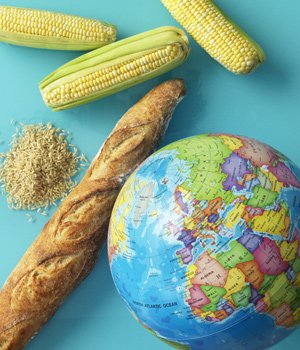
The UN food and agricultural body announces that global food prices sharply rebounded in July due to wild swings in weather conditions.
The rise has fanned fresh fears of a repeat of the 2007-2008 food crisis which hurt the world’s poorest.
Untimely rains in Brazil, drought in the US and production difficulties in Russia drove the rally, said the Food and Agriculture Organization (FAO).
Food prices jumped 6% in July from June after falling three months in a row.
The FAO food price index measures the monthly price changes for a basket of food commodities including cereals, oilseeds, dairy, meat and sugar. The index reading in July was still well below the all-time high reached in February 2011.
The Rome-based organization took the surprise step of publishing the index this month – which it usually does not – due to the exceptional market conditions affected by unusual weather patterns.

Cereal prices surged 17%, while sugar leapt 12% to new highs in July from the previous month after rains hampered sugarcane harvesting in Brazil, the world’s largest producer.
Delayed monsoons in India and poor rains in Australia also contributed to higher prices.
“The severe deterioration of maize crop prospects in the US following extensive drought damage pushed up maize prices by almost 33% in July,” said the FAO.
The price of rice and dairy was unchanged, although meat fell 1.7% due to a slump in pork prices.
The surge in prices have renewed fears of a food crisis that plagued countries in 2007-2008, sparking violent street protests in countries like Haiti and Egypt.
“There is a potential for a situation to develop like we have back in 2007-2008,” said FAO senior economist and grain analyst Abdolreza Abbassian.
“There is an expectation that this time around we will not pursue bad policies and intervene in the market by restrictions, and if that doesn’t happen we will not see such a serious situation as 2007-2008. But if those policies get repeated, anything is possible,” he added.
Higher food prices hurt the world’s poorest countries because it means they will need to pay higher import bills as they do not produce enough food at home.
Oxfam said that since the beginning of the year, rising food prices and drought had caused a food crisis in the Sahel sub-region of west and central Africa, affecting more than 18 million people over an area of land as wide as the US.
“This is not some gentle wake-up call – it’s the same global alarm that’s been screaming at us since 2008,” said Hannah Stoddart, Oxfam’s head of economic justice policy, regarding the FAO data.
“These latest figures prove yet again that there is something fundamentally flawed in the way we produce and distribute food around the world. For too long our leaders have stood by complacently, while up to a billion people go hungry worldwide,” she said.
“The time to act is now.”